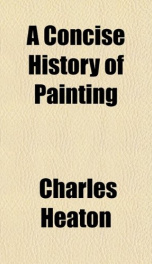a concise history of painting

Purchase of this book includes free trial access to www.million-books.com where you can read more than a million books for free. This is an OCR edition with typos. Excerpt from book: Spain, where he acquired great wealth in the exercise of his calling, and likewise learnt from the Spaniards " to be gentle and courteous," a lesson, it would appear, that he stood much in need of. Stamino is principally important from the fact that Masolino was his pupil, a name which brings us to the fifteenth century in Florentine art, and to a new period in its development. The painters mentioned in this chapter are sometimes called the Trecentisti, or masters of the fourteenth century. The next chapter will be devoted to the Quattrocentisti, or masters of the fifteenth century, who prepared the way for the great masters of the sixteenth century, the Cinquocentisti. chapter{Section 4 Chapter II. THE DEVELOPMENT. Masaccio -- Fra Angelico -- Mantegna -- Luca Signorelli -- Perugino -- Francia. HE fifteenth century was an age of rapid intellectual growth. Everywhere the germs that had been planted in the two preceding centuries started into vigorous life, and sent forth shoots in new directions. With this age, indeed, the history of the modem world may fairly be said to begin, for with the knowledge of the true solar system, the discovery of America, and the invention of printing, the mind of man first attained its enfranchisement from ignorance and superstition. Yet in all paths of knowledge the works of the fifteenth century can only be regarded as the preparation for those of the sixteenth. In art especially this was the case. The great artists of this age were the forerunners of the still greater artists ofthe next. Masaccio and Mantegna prepared the way for Michael Angelo; Fra Angelico and Perugino for Raphael, and Bellini for Titian. At the beginning of the century Florence, so soon to fall under the golden yoke of the Medici, was still a free rep...
Info about the book
Author:
Series:
Unknown
ISBN:
1440047308
Rating:
5/5 (3)Your rating:
0/5
Languge:
English
Users who have this book
Users who want this book
What readers are saying
What do you think? Write your own comment on this book!
write a commentGenre
if you like a concise history of painting try:
Other books by this author
Do you want to exchange books? It’s EASY!
Get registered and find other users who want to give their favourite books to good hands!

